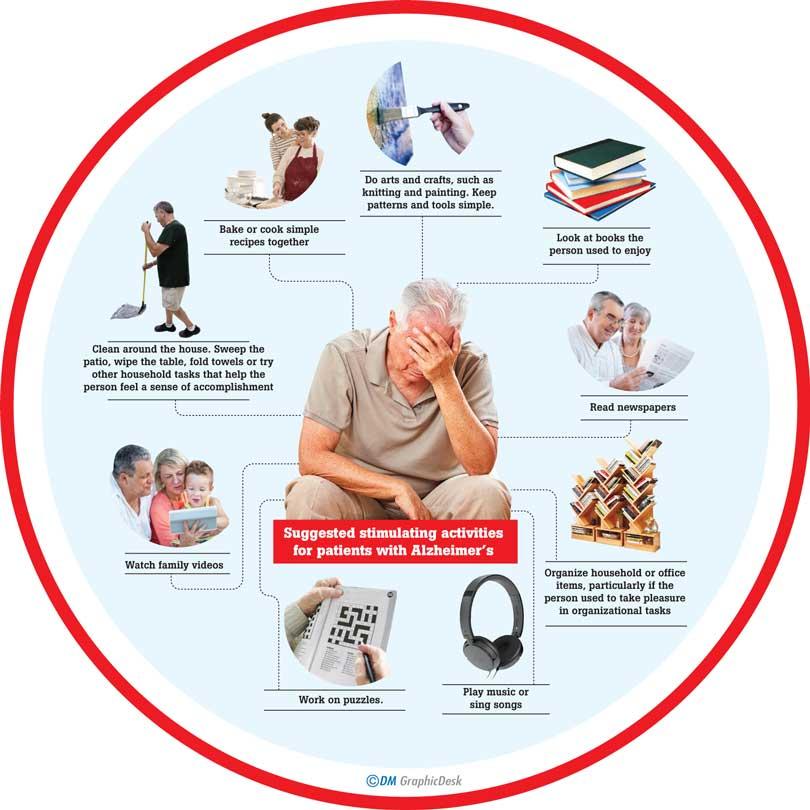20 Sep 2019 - {{hitsCtrl.values.hits}}

 Old age is a stage that we all need to accept in this cycle of life. While in your retirement you could opt to do various activities to keep yourself engaged. But for some, it is not as easy as they think it is. Come old age, you are also burdened with health complications. As the memory span weakens, you are subject to newer challenges. Dementia is one such obstacle. If it’s progressive dementia, chances are high that you would eventually be diagnosed with Alzheimer’s disease. While there’s no medication to slow it’s progression it is important to preserve quality of life. But the quality of life is determined by how they are being treated by those around them. As World Alzheimer’s Day falls tomorrow (September 21), this year’s theme will focus on raising awareness and challenging stigma.
Old age is a stage that we all need to accept in this cycle of life. While in your retirement you could opt to do various activities to keep yourself engaged. But for some, it is not as easy as they think it is. Come old age, you are also burdened with health complications. As the memory span weakens, you are subject to newer challenges. Dementia is one such obstacle. If it’s progressive dementia, chances are high that you would eventually be diagnosed with Alzheimer’s disease. While there’s no medication to slow it’s progression it is important to preserve quality of life. But the quality of life is determined by how they are being treated by those around them. As World Alzheimer’s Day falls tomorrow (September 21), this year’s theme will focus on raising awareness and challenging stigma.
Stigma and discrimination
When people hold negative beliefs or attitudes about Alzheimer’s disease, they may stereotype, isolate, or discriminate against patients. Even when intentions are good, people could still patronise or pass unfair judgments about an individual’s abilities. The patients themselves feel poorly about themselves. “Stigma and discrimination are the biggest issues,” said Beverly Mirando, a board member at the Lanka Alzheimer’s Foundation (LAF). “People are not aware and this is why we organise events and get them to participate. 60% of all patients have dementia, but they are not aware. We don’t get funds from overseas, but we receive funds from donors and raise funds from various activities. September is declared the Alzheimer’s awareness month and we organise many events. We recently concluded the annual run and are looking forward to the walk scheduled for September 28. These are the two main events and apart from that we have a Scrabble Bash in February and an annual sale in November.”
The Foundation also conducts various awareness programmes both in and out of Colombo. “We have programme officers who go out of Colombo and speak to senior citizens,” she continued. “We emphasise on old age and forgetfulness. Once a senior citizen walks in we do a memory screening test free-of-charge. If there’s an indication of dementia or Alzheimer’s we advice them to follow it up. We have a doctor who conducts these screenings.”
LAF includes an activity Centre where volunteers spend time with patients. “We need to get the youth involved in this process,” she added. “Our volunteers are very committed. We have families bringing their parents and when they arrive we get them to sing and engage in various activities. That’s all we could do. When a family member develops signs, you need to get ready to deal with it and it’s not easy.”
Tomorrow, on World Alzheimer’s Day, LAF has also planned a full day programme in collaboration with Lanka Hospitals. The programme will attract the participation of experts in the field who will shed light on topics such as diagnosis and management of dementia. It will also include public education stalls and many other items which will help spread awareness on dementia and Alzheimer’s disease. The event will be held from 9.30am to 5.00pm at Lanka Hospitals premises.
Symptoms
Alzheimer’s and dementia could indicate some early warning signs. These include :
If you are caring for someone with Alzheimer’s disease or a related dementia, your role in managing daily tasks would increase as the disease progresses. Here are a few things to keep in mind :
Reduce frustrations
A person with dementia might become agitated when once-simple tasks become difficult. To limit challenges and ease frustration:
Schedule wisely - Establish a daily routine. Some tasks, such as bathing or medical appointments, are easier when the person is most alert and refreshed. Allow some flexibility for spontaneous activities or particularly difficult days.
Take your time - Anticipate that tasks may take longer than they used to and schedule more time for them. Allow time for breaks during tasks.
Involve the person - Allow the person with dementia to do as much as possible with the least amount of assistance. For example, he or she might be able to set the table with the help of visual cues or dress independently if you lay out clothes in the order they go on.
Provide choices - Provide some, but not too many, choices every day. For example, provide two outfits to choose from, ask if he or she prefers a hot or cold beverage, or ask if he or she would rather go for a walk or see a movie.
Provide simple instructions - People with dementia best understand clear, one-step communication.
Limit napping - Avoid multiple or prolonged naps during the day. This can minimise the risk of getting days and nights reversed.
Reduce distractions - Turn off the TV and minimise other distractions at mealtime and during conversations to make it easier for the person with dementia to focus.

Creating a safe environment
Dementia impairs judgment and problem-solving skills, increasing a person’s risk of injury. Here are a few ways you could ensure and promote safety:
Prevent falls - Avoid scatter rugs, extension cords and any clutter that could cause falls. Install handrails or grab bars in critical areas.
Use locks - Install locks on cabinets that contain anything potentially dangerous, such as medicine, alcohol, guns, toxic cleaning substances, dangerous utensils and tools.
Check water temperature - Lower the thermostat on the hot-water heater to prevent burns.
Take fire safety precautions - Keep matches and lighters out of reach. If the person with dementia smokes, always supervise smoking. Make sure a fire extinguisher is accessible and the smoke and carbon monoxide detectors have fresh batteries.
Focus on individualised care - Each person with Alzheimer’s disease would experience its symptoms and progression differently. Tailor these practical tips to your family member’s needs.
Patience and flexibility — along with self-care and the support of friends and family — can help you deal with the challenges and frustrations ahead.
Stimulating activities for patients
It is important to keep seniors occupied with various stimulating activities once diagnosed with dementia. These activities encourage self-expression, foster emotional connections with others, lessen any anxiety and irritability that comes with Alzheimer’s, make them feel more engaged and stir memories.
Apart from activities that make them pass time, you could also consider engaging them in hobbies they liked doing but they may have to be modified for practicality and safety. This is because Alzheimer’s affect behaviour and senses in addition to memory. So the activities they once liked doing could be frustrating and overwhelming.
22 Dec 2024 14 minute ago
21 Dec 2024 21 Dec 2024
21 Dec 2024 21 Dec 2024
21 Dec 2024 21 Dec 2024
21 Dec 2024 21 Dec 2024